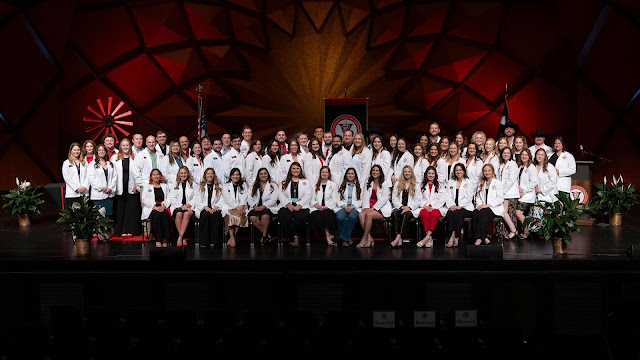As white coats were placed onto 62 students in Texas Tech University's School of Veterinary Medicine during a Sunday (March 17) ceremony, the act symbolized the knowledge, skills and other qualities of doctors they have developed since their first classes began in August 2021.
Facing a crowd of family and friends, they also publicly reaffirmed their student oath: to develop scientific and medical knowledge and skills so that upon graduation, they can benefit society through the protection of animal health, the relief of animal suffering, the conservation of animal resources, the promotion of public health and the advancement of medical knowledge.
This first White Coat Ceremony, hosted at the Globe-News Center for the Performing Arts, featured keynote speakers that included Amarillo Mayor Cole Stanley, School of Veterinary Medicine Dean Guy Loneragan and Texas Tech President Lawrence Schovanec.
“It's a very special group of young women and men,” Schovanec said. “I'm sure the special bond they share will be an important part of their life. But this class will also be distinguished by what they do and how they serve needs across this state, especially rural and regional communities. Providing service for these communities was an important motivation for establishing the Texas Tech University School of Veterinary Medicine.”
This White Coat Ceremony celebrated the beginning of the students' lifelong journey of continual knowledge and competence which will kick off when their clinical rotations begin in May. At that point, they will transform into clinicians providing care at more than 100 partnering veterinary clinics located across Texas and New Mexico.
Loneragan commended their educational milestone in which they now progress from the classroom into the clinic, which he explained is a sacred rite of passage in the training of medical professionals.
“Achieving this step is no mean feat,” Loneragan said. “It takes tremendous determination, resilience, adaptability and a healthy dose of grit. Students overcome many hurdles to arrive at this stage of their education.”
These students, who are members of the inaugural graduating class in 2025, are fittingly referred to as pioneers. Former Texas Tech University System (TTU System) Chancellor Robert Duncan, who was crucial to bringing the School of Veterinary Medicine to fruition, is impressed with the class members he has met.
“All of these students in the school are special because they were carefully selected to meet the goals and objectives of the school,” Duncan said. “They're folks we're going to see go out into the industry, make a difference, and be a great part of the brand for the Texas Tech community.”
It is a dream come true for Duncan to know the School of Veterinary Medicine students will enter the veterinary industry during their clinical year. He hopes the experience will combine their academic and clinical education with applicable day-to-day knowledge they will gain from the partnering veterinary clinics.
“It's not just the veterinary medicine side of it,” Duncan explained. “It's also the veterinary business side and how veterinarians in smaller, agricultural communities can make their expandable practices be efficient and provide the highest quality services to patients and clients.”
Schovanec explained that moving forward, many people will look to the inaugural class to see not only how they fulfill the School of Veterinary Medicine's aspirations and vision, but how they impact the agricultural industry.
“Many graduates of vet schools were practicing in urban areas along the I-35 corridor, with a focus on small animal care,” Schovanec said. “The Texas Tech School of Veterinary Medicine has made a concerted effort to enroll students from smaller communities and rural backgrounds, with the expectation that graduates would be more inclined to address needs in these types of rural and regional communities.”
Tedd L. Mitchell, M.D., chancellor of the TTU System, said the School of Veterinary Medicine is addressing the disparity of practitioners in urban compared to rural areas that has developed not just in Texas but across the nation over the past 50 years.
Not only that, but the School of Veterinary Medicine is located on the same property as the Texas Tech University Health Sciences Center's five schools in Amarillo – which was intentional as they share an overlapping mission.
“When it comes to research and the development of practitioners, one of the things we are focused on from a system perspective is what we call a One Health concept,” Mitchell said. “This is where the health of animals, the health of humans, and the health of the environment all intersect. Having these schools co-located on the same property is a wonderful way to focus on the One Health concept of overall well-being.”
Mitchell believes the School of Veterinary Medicine is a seminal moment in the course of academic history that will forever change the trajectory of what the TTU System represents to West Texas and beyond.
He congratulated the inaugural class members and offered a few words of advice as they were cloaked in white and ready to embark upon their clinical year.
“Enjoy it – you absolutely belong there,” he said. “Your learning curve is about to accelerate dramatically. There will be things you had forgotten you studied, that once you start seeing your patients, will come back to you very, very quickly. You're right where you need to be.

















